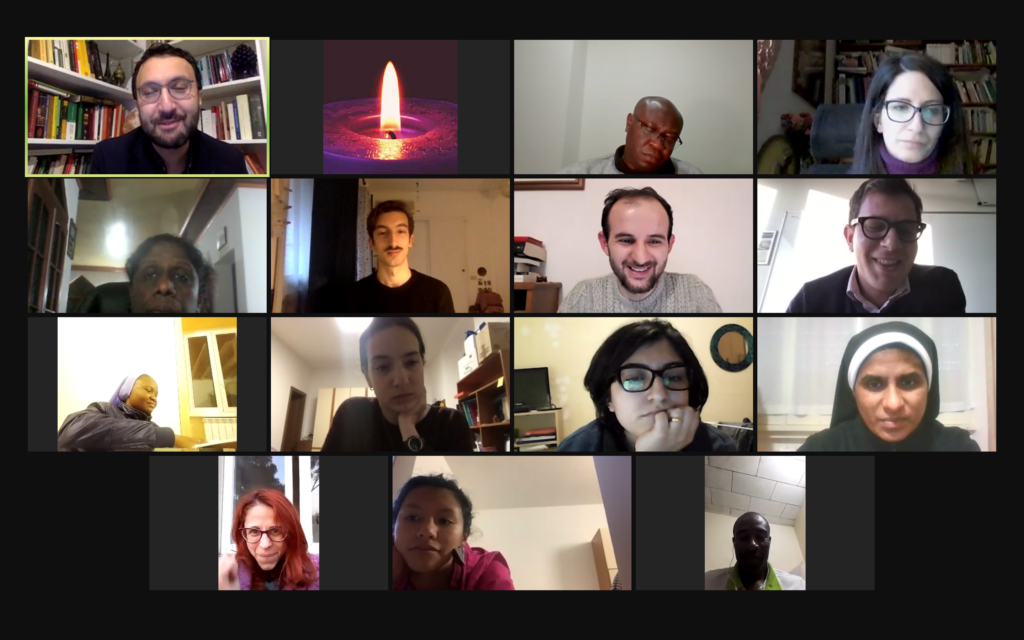On the evening of Thursday April 22nd, the Russell Berrie Fellows and JPII Leaders were invited to join our friends at Istituto Tevere for an online Iftar. Iftar is the meal eaten by Muslims after sunset during Ramadan. Usually this is a time for family, friends and neighbours to come together. Since this year people cannot physically meet for the Iftar dinner, a good alternative in the spirit of the dialogue was for the John Paul II Center for Interreligious Dialogue’s Fellows and Istituto Tevere’s friends to gather and meet each other virtually.
Istituto Tevere is a dialogue center, founded in Rome in 2007 in order to promote dialogue, intercultural and interreligious studies, as well as to create opportunities for people with different cultural and religious backgrounds and all kinds of philosophical convictions to meet.
Before the breaking of the fast, we met to exchange a few words on zoom. Cenap Aydin, director at Istituto Tevere, first shared a little information about Ramadan. The holy month of Ramadan celebrates the time when the Qur’an, the Word of God, was revealed. The month starts when people spot the new moon and ends with the next new moon. He explained that because Ramadan is determined by the lunar calendar, the date moves back 10-11 days each year in the Gregorian calendar.
He laid out his average day in Ramadan; it starts with Suhur, a light meal finished before 4:20am now (the exact timing depends by the dawn). Typically Mulisms will then not eat nor drink from the time right before sunrise until sunset. This includes no water; yes, even water! Because of this, he said that it is very important for Muslims to observe their health during Ramadan. He noted that in Rome this year fasting time is around 16 hours but in other parts of the world it would be longer or shorter depending on their latitude.
When asked if there were specific guidelines around fasting, Cenap said that Muslim guidelines for fasting follow many of the earlier teachings from the Jewish and Christian traditions; he then drew comparisons between fasting in Ramadan and the Jewish fast during Yom Kippur and Christian fasts for Lent. Cenap said that in the Islamic tradition, like in the Christian Gospel of Matthew (6:16-1), fasting should remain something just between you and God. “When you are alone and the water is in front of you, you don’t drink it,” Cenap reasons, “even though the only one who observes you is God, you do it for God.”
When speaking of exceptions to fasting, Cenap explained that the idea is not to put another burden on someone; fasting is not an obligation for those who are not healthy (both physically and mentally), children under the age of puberty, pregnant women, the elderly, and travellers. Ramadan is a devotional month of mercy; a time to be of service to others and to give alms, to study and recite Quran, a time of extra prayers and moments of contemplation on the poor and hungry people in the world and the gifts given by God. The month ends with a 3-day celebration called Eid Al-Fitr, meaning “Festival of Breaking Fast” in Arabic. Eid Al-Fitr 2021 will begin in the evening of May 12th.
Isuf of the Istituto Tevere spoke about Ramadan operating at 4 levels that bring you closer to God: Spiritual, Physical, Familial, and Sociological. He explained that in Ramadan you grow by reciting extra prayer and doing Quranic study, you take care to rest the body, you come together with family during Iftar to become closer, and fasting makes you more aware of wasting things which goes against capitalism. Reflecting on why Ramadan is important to him personally, Isuf said “I might be hungry for 16 hours but at the end of the day, I know that I will eat in 20 minutes. The poor do not have that chance.”
Senat who was connecting from London explained that he sees Ramadan as a split between the Spiritual prayers of the night and the material avoidance of eating, drinking, smoking or sexual relations during the day. For him, it is joy when Ramadan comes because it brings both blessings and surprises.
It also brings temptation, which Cenap would say is the most difficult part of the month. His warning for those easily frustrated or angered while fasting from food or water or cigarettes is to watch how you use your tongue. He said that the ethical response to verbal attacks is just to say “I am fasting.”
At the moment of sunset, the adhan, the Islamic call to prayer, was played on our screens and our Muslim friends broke their fasts by eating dates and drinking water. Cenap explained that dates are not only an energizing fruit but was also a tradition of the Prophet Mumammad (PBUH). Russell Berrie Fellow Ana reflected on this moment, saying that she was watching the sun set from her balcony in Rome while we listened to the call to prayer and she felt very connected to nature.
Cenap closed the evening with a beautiful benediction, “We are children of Abraham, called to promote coexistence in the world so we are grateful to share this precious moment with you all.”
We hold our Muslim friends and their families in our prayers in this time of fasting; May Ramadan bring you many blessings! Ramadan Mubarak!

